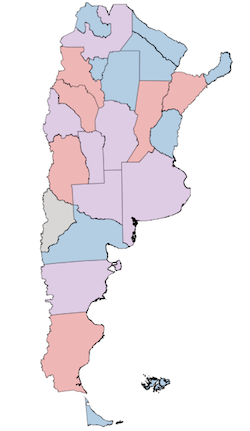In one of the most important tests before Argentina’s general election, the hand-picked successor of outgoing Buenos Aires mayor Mauricio Macri, the chief center-right presidential candidate, only narrowly won a July 19 mayoral runoff.![]()
![]()
Just three weeks out from Argentina’s crucial national presidential primary, the Buenos Aires mayoral results are being reported as a drag on Macri’s presidential campaign, and that’s true — to a degree. Macri’s long-serving chief of cabinet, Horacio Rodríguez Larreta (pictured above, left, with Macri, right), garnered just 51.6% of the vote in a two-way race he was once expected to win easily by a double-digit margin. So while Rodríguez Larreta’s victory extends a three-term governing streak for Macri’s conservative Propuesta Republicana (PRO, Republican Proposal), it fell too far short of expectations. After all, Buenos Aires is the PRO’s heartland — Macri’s reach barely extends beyond the city to the larger Buenos Aires province, let alone the rest of the country.
With an open presidential primary taking place on August 9, however, and the October 25 presidential and parliamentary elections following shortly thereafter, the city’s mayoral election was a key test for Macri, who is trying to succeed Cristina Fernández de Kirchner, herself term-limited from seeking reelection.
Macri essentially occupies the conservative side of the presidential campaign — he hopes to win by picking up support from Argentine moderates and disenchanted kirchneristas without seeming too neoliberal. The winner of the 2015 election will be the first president in 12 years not to be a member of the Kirchner family, and Argentine voters may be ready for a modest change after the 21st century version of peronismo, as personified by the late Néstor Kirchner and his wife, Cristina Fernández de Kirchner, who hopes to guide the ruling Frente para la Victoria (FpV, the Front for Victory) to yet another term.
Macri, for his part, wants to contrast the strength of his eight-year stewardship of the relatively wealthier city against the record of the FpV’s 2015 presidential candidate, Daniel Scioli, since 2007 the governor of the surrounding (and more impoverished) Buenos Aires province, and of Tigre mayor Sergio Massa, another center-left peronista who broke in 2013 with kirchnerismo to form the Frente Renovador (FR, Renewal Front).
It’s no surprise, by the way, that three politicians from the Buenos Aires region are vying for the presidency — the city, an autonomous federal district, together with the Buenos Aires province, is home to nearly 50% of Argentina’s 41.5 million citizens.
Argentina’s Goldilocks election
All three candidates — Scioli, Massa and Macri — have indicated they would pursue a more investment-friendly administration, and Macri, in particular, benefits from heading the most business-friendly government during the Kirchner era.
* * * * *
RELATED: Everything you need to know about
Argentina’s impending default
* * * * *
Macri nevertheless emphasizes that he’ll introduce only gradual shifts in policy, lest voters worry he’ll return to the economic policies of the disastrous 1990s.
Presumably to win Fernández de Kirchner’s support, Scioli last month named as his running mate Carlos Zannini, a fierce Kirchner loyalist who has served as the president’s legal secretary since 2003. But Scioli has emphasized that he wants to remove, however slowly, the capital controls of the Kirchner era, and to govern in a less interventionist and inflammatory manner.
Massa has positioned himself in between Scioli and Macri and, though his poll numbers seem to have dipped, seemed like the wide frontrunner following his breakout performance throughout Buenos Aires province in the October 2013 midterm elections.
Why the Buenos Aires mayoral race probably
won’t be important to the October election
While there are a lot of reasons why Macri could still lose the presidential race, it’s not particularly clear that either Scioli and the governing FpV or the upstart Massa should take too much comfort from the Buenos Aires mayoral election.
Continue reading Tight Buenos Aires victory slightly complicates Macri’s presidential hopes


